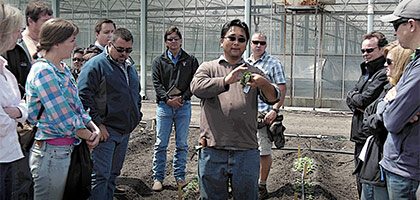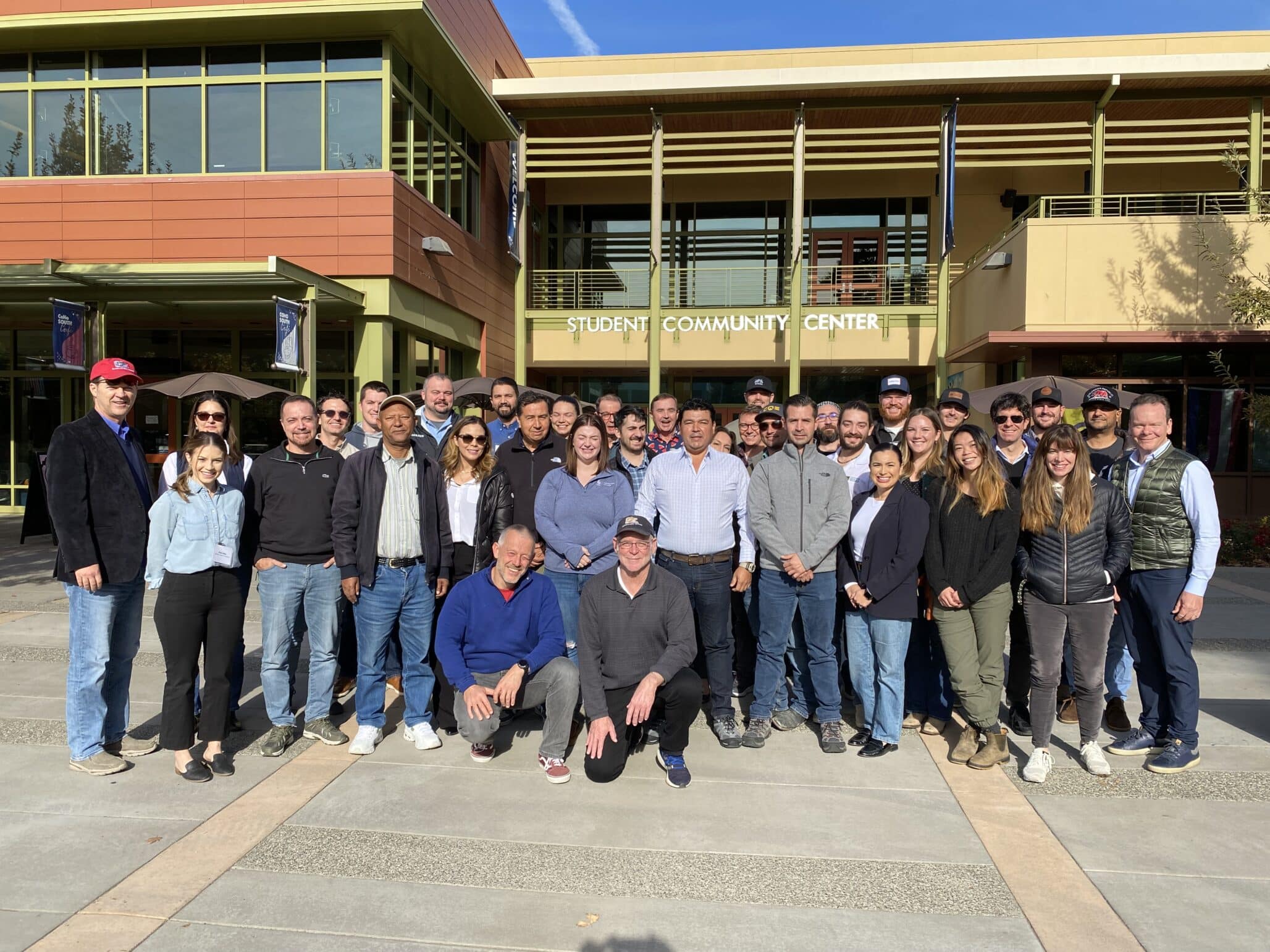Training the Force
To solve the world’s biggest challenges, the seed industry relies on a highly skilled workforce, and the University of California, Davis, works to prepare those individuals.
Childhood stunting is one of six key issues identified by the World Health Organization, which has set out to reduce the number of children less than five years of age affected by stunting by 40 percent by 2025. In Africa, nearly 40 percent of all children display signs of stunting, according to WHO data. Caused primarily by malnutrition, stunting affects more than just physical appearance. Long term, it means poorer school performance, a decreased learning capability, and lower work and production capacities.
WHO isn’t the only one helping to reduce stunting. It’s a condition that members of the Seed Biotechnology Center at the University of California, Davis, are working to remedy through its Plant Breeding Academy in Africa.
The African academy is a 13-month program — designed to address the small number of plant breeders being trained in traditional academic programs — that teaches the principles of plant breeding to seed industry personnel. The first session was launched in December 2013 in Nairobi, Kenya, in partnership with the New Partnership for Africa’s Development (NEPAD), which is part of the African Orphan Crops Consortium.
The academy plans to sequence, assemble and annotate the genomes of 100 traditional African food crops to guide development of vegetables, fruits and other agricultural products that are more robust and nutritious.
Naoki Yaya, a graduate of the Plant Breeding Academy, gives a radish breeding demonstration to a Plant Breeding Academy class on a field tour to Sakata Seeds in Salinas, California.
“We’re not talking about corn or soybeans,” says Allen Van Deynze, Plant Breeding Academy co-founder and UC-Davis plant science researcher. “It’s baobab, finger millet — crops we don’t eat or even think about in North America, for the most part.”
Agriculture and the seed industry are booming, and both have come into the spotlight as being pivotal toward solving global challenges. “Somewhere around 2005, the industry started recognizing that there’s a tremendous need for plant breeders but we didn’t really have a supply of them,” Van Deynze says.
That’s where UC-Davis and the Plant Breeding Academy come into play. Van Deynze, Rale Gjuric, Kent Bradford and their colleagues at the Seed Biotechnology Center have established Plant Breeding Academies around the world. The premium professional certificate program has been available since 2006 in the U.S., Europe and Asia. Although the curriculum is similar across locations, the African Plant Breeding Academy is a higher-level course because it’s designed to train Ph.D. breeders active in the field, most of whom work for public institutions.
“The academy is driven by industry as opposed to the public sector, but there’s also a need in the public sector as people retire,” Van Deynze says. “A lot of people thought molecular biology and transgenics were more fascinating than kicking dirt in the field. We had fewer people going into plant sciences, in general, especially plant breeding. That trend is changing now.”
Education Affords Advances
The Plant Breeding Academy not only affords more people the opportunity to work toward crop improvement, but also gives people a chance to advance professionally, thus creating a better life for themselves and their families.
“Companies invest in their employees and say ‘we’re going to put you through this program so you can advance; we think you can do it,’” Van Deynze says. “They use the program to recruit and maintain quality employees, and it’s worked. Most companies that have sent us one student have sent another one. For us, that’s the best evaluation we can get.”
Peter Salm, a commercial plant breeder since 1967, encouraged his colleague Bill Colfer to further his education by enrolling in the Plant Breeding Academy. “Peter shared with me his applied expertise for 16 years and recommended that I continue my development by attending the academy,” shares Colfer, who serves as the artichoke breeding manager for Plant Science Inc. and considers Salm his mentor.
With the support of his company, Colfer started his coursework in 2011. “The program required significant effort on my part, but it was worth every minute I invested,” says Colfer, who finished the course in 2013.
Although he’s based in the United States, Colfer enrolled in the European Plant Breeding Academy. “This turned out to be very fruitful,” he says. “Not only did I expand my knowledge as a plant breeder, but I also expanded my knowledge of the European breeders and the programs they work in, promote and serve. This included men and women in a wide range of field crops, as well as vegetables and fruits. We weren’t sharing trade secrets, but rather the various ideas and methods.”
That’s just the sort of experience Van Deynze says makes the Plant Breeding Academy such an effective program. “The companies we visit are really quite open with the students,” he says. “They don’t tell us their company secrets, because it’s their competitors they’re talking to, but companies are mature enough to say ‘I can tell you what I’m doing, but you don’t have my germplasm and that’s really my strength.’”
Colfer continues to work for Plant Sciences Inc. “Continuing education has always been a professional goal of mine,” Colfer says, adding that his increased knowledge around theory and the vast number of disciplines exercised in plant breeding has been very gratifying.
One of the people who helped conceive the idea for the Plant Breeding Academy was George Kotch, now a regional vice president of research and development for vegetable seed breeding group HM CLAUSE in Davis, California.
“I came to UC-Davis and said ‘you know, we’re in desperate need of people who know plant breeding,”’ Kotch says. “Some of our high-performing employees are coming out of master’s and bachelor’s programs and they really don’t know anything about commercial plant breeding. You have this pool of people who want to step up but don’t have a vehicle to bring them to that higher level, because they lack training. I thought maybe there could be a way to create a mini-program so they could be pulled out of their normal job for a week, come back to school and get retrained for plant breeding.”
To take part in any of the postgraduate Plant Breeding Academies offered around the globe, students need at least a bachelor’s degree in plant biology, with a minimum of an introductory class in genetics and statistics. They also need experience in the seed industry, and a desire to become a plant breeder. Traditionally, the program is two years of study with six in-person sessions. Due to its interactive nature, the class size is limited to 20.
To-date, the Plant Breeding Academy has awarded 124 certificates of completion, which helps put more minds to work searching for keys to crop improvement.
The Business of Seed
Unlike the Plant Breeding Academy, the Seed Biotechnology Center’s Seed Business 101 course targets promising new employees and new managers. “It’s designed to shorten the learning curve for people new to the seed industry,” says Van Deynze. “For example, someone could be in marketing in another industry but now works in the seed industry. This sort of crossover happens frequently.”
Seed Business 101 also educates employees about different departments and functions within a seed company. “This allows them to better communicate with their colleagues, as well as have opportunities to move within a company,” he says.
During the course, students get involved in real-life scenarios. They are put in charge of a fictional seed company, complete with financial details, inventories and even a complete history of the company. “The students are basically immersed in the business of this company, and work on case studies dealing with different functional areas of the company,” says Rale Gjuric, Seed Business 101 course instructor and organizer. “They have to work as a team and come up with solutions to problems.”
The course focuses on the five major functional areas of a seed company — plant breeding research, production, operations, sales and marketing, and administration.
The goal is to enhance each participant’s career performance and help him or her avoid costly mistakes, says Gjuric. It’s not just a course for young people. “We get a lot of senior people, from financial managers to legal experts, all coming from different industries,” Gjuric says. “They have to understand how a seed company works throughout all its functional areas.”
Participants walk away with a broad understanding of the major aspects of a seed company’s operations and a cross-departmental knowledge of best practices for profitability, taught by instructors who have been there and know the inner workings of the seed business. “They are experienced — many are retired or are former members of the seed industry,” Gjuric says.
Van Denyze adds that the course’s instructors are one of the things that make it so effective. “It’s taught by people who’ve been in the seed industry for 20, 30 and 40 years — former CEOs and presidents. These guys just love to do that,” he says.
It’s the strong background of its instructors that has earned the Seed Business 101 course rave reviews from those who have taken it. Ken Piecharka, production manager at the Canadian-based pedigreed seed company HyTech Production Ltd., took the Seed Business 101 course in 2013.
“The instructors spent a lot of time preparing case studies,” Piecharka says. “They had an incredible amount of personal experience. I learn best from hearing examples, stories from real-life cases, and that was how it was delivered. I don’t know if there could be more knowledgeable people than the three instructors we had.”
Piecharka took the course because he was going through a career transition. “There are not a lot of courses like this. I needed structured training from real industry experts,” he says.
Fill the Gaps
The goal of Seed Business 101 and the Plant Breeding Academy, Van Deynze says, is to inject some much-needed new blood into the seed industry. “In agriculture, we can guarantee you a good job at the end of a graduate degree,” Van Deynze says. “There are very few sectors that can say the same.”
Industry praises the efforts of UC-Davis and its Seed Biotechnology Center. “They are the conduit for private companies to interface with UC-Davis,” says HM CLAUSE’s Kotch. “Many universities are internally focused, but the UC-Davis group is far more externally focused. We do as much as we can with them, because they understand us and we want to support them. That’s a pretty rare interaction these days.”
Hopefully one day all that external focus will help find a solution and put a stop to childhood stunting and malnutrition in Africa and around the world.
Marc Zienkiewicz













